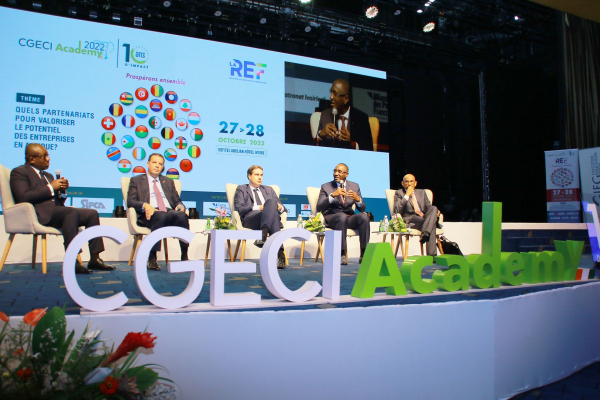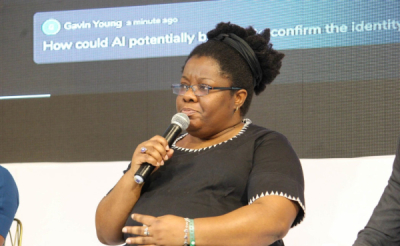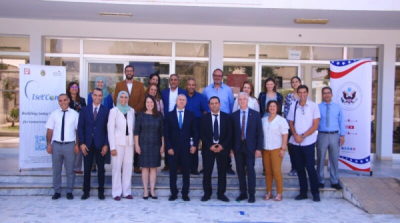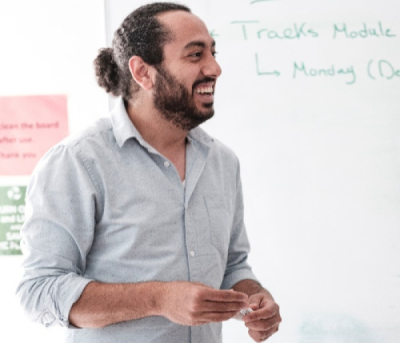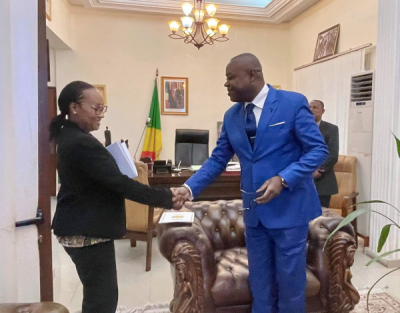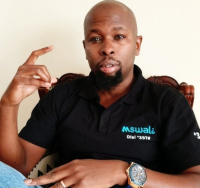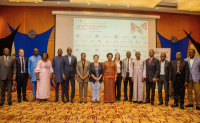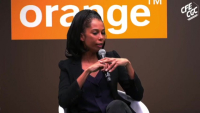The African digital economy is a promising sector that is expected to be worth US$712 billion by 2050, or 8.5% of continental GDP. To capitalize on its dividends, several countries are implementing digital transformation strategies. Some of them, including Côte d’Ivoire, have accelerated their plans, after the coronavirus pandemic.
Côte d’Ivoire needs more than XOF2 trillion (US$3 billion) to complete its digital infrastructure program, Digital Minister Amadou Coulibaly indicated last Friday. The official presented the estimate during a plenary session around the theme "Investing in Côte d'Ivoire", at the 10th edition of the CGECI Academy organized by the General Confederation of Enterprises of Côte d'Ivoire (CGECI) - Patronat Ivoirien.
The program includes the construction of the National Data Center and the completion of the national backbone. The two projects, slated for completion in 2025, will complement the others planned under the national digital development strategy and support economic development.
The data center will bring together, in one secure location, all the public services that the government is currently dematerializing, therefore ensuring their efficiency. As for the national backbone, it will help provide cheaper broadband -an essential requirement for enhancing access to dematerialized services and socio-economic opportunities- to every household.
According to Minister Amadou Coulibaly, a National Digitalization Committee will be set up to coordinate digital development activities. He added that the Prime Minister would launch the committee’s activities in the coming months.
The projects mentioned are part of the 2025 digital strategy developed under the Ministry of Digital Economy’s lead and adopted during the December 22, 2021, Ministerial council. The strategy suggested 32 reforms and 96 projects to be implemented over the 2021-2025 period. Its indicative budget is XOF2 trillion.
According to the World Bank, Côte d’Ivoire could generate over US$5.5 billion and US$20 billion from the digital economy respectively by 2025 and 2050 if the strategy is effectively implemented.
Samira Njoya
In Africa, hospitals are still recording numerous deaths caused by the shortage of blood products. To solve this problem in his country, a Sierra Leonean tech entrepreneur has set up an e-health solution facilitating blood donation.
LifeBlood is a digital platform developed by a Sierra Leonean eponymous startup. It allows users to donate blood in a few clicks.
With its mobile app "Donate Blood," it streamlines the blood donation process. Once a user downloads the app and registers an account, he/she can carry out a blood test and, if everything goes well, donate blood and set a donation frequency. The app reminds its users of upcoming donations.
The Sierra Leonean startup has numerous blood donation centers, across the country. Its centers are usually set up in hospitals, giving users the choice to get to the centers closer to their homes or offices depending on their schedules. This approach helps users donate blood without causing much disruption to their tight schedules.
It also allows users to set up blood donation campaigns, and define the targets, periods, etc. With this feature, it aims to allow users to support its actions, therefore increasing the number of unpaid voluntary donors and improving the operational efficiency of blood services and the national blood safety service.
For its actions, the startup won the first prize of the Orange Social Venture Prize in Africa and the Middle East (POESAM), going home with a €25,000 check.
Adoni Conrad Quenum
In Nigeria, she is one of the pioneers of extended, augmented, and virtual reality. She sees those tech tools as interesting opportunities to offer innovative solutions to the population.
Judith Okonkwo (photo) is a Nigerian business psychologist and the founder of Imisi 3D, an extended reality creation lab based in Lagos, Nigeria.
Through the creation lab, launched in 2016, Judith nurtures an African community of augmented and virtual reality content creators. She also creates virtual and augmented reality solutions and provides “educational and engagement experiences with AR/VR.” She aims to “change the technology narrative so that [Africans] become creators and not just consumers of technology.”
In line with that mission, she recently partnered with Meta and Black Rhino VR to launch the Sub-Saharan Africa and North Africa AR/VR metathon, on October 24. Through this event, one of the first of its kind in Africa, the young woman wants to find and support African innovative augmented, extended and virtual reality solution creators.
The business psychologist places high hopes in the metathon, slated for mid-August 2022- April 2023. Imisi 3D “is our biggest and most ambitious event yet, providing even greater access for XR. […] This year’s AR/VR Africa Metathon brings together our AR/VR Africa pre-hackathon training, hackathon, and Bootcamp in one program,” Judith Okonkwo explains.
Since August 2022, she is a visiting global scholar at Harvard University. From 2017 to date, she has led AR/VR Africa, an African community of augmented, virtual, and mixed reality creators and enthusiasts that she founded. From 2016 to date, she is also a member of the World Economic Forum Global Future Council on VR/AR. She is also a co-founder of We Will Lead Africa, a global network that creates platforms to share experiences and inspire leadership in Africa.
Since 2013, Judith Okonkwo is the Director of the European Organisation Design Forum. She is also a visiting lecturer and researcher at the Centre for Business Psychology at the University of Westminster, since 2005. In 2008, she founded the leadership development center Oriki Leadership Coaching and co-founded the international facilitation and consulting firm Tomorrow by Design in 2014.
Her professional career began in 2000, as a press release and recruitment officer for the 31st Nigerian Artillery Brigade. In 2001, she was recruited to the Human Resources Department of the United Bank for Africa (UBA) before joining Insights Learning and Development in 2007 as a corporate psychologist. She later worked for British Airways (2011 to 2016) as an organizational intelligence consultant. While still working for British Airways, in 2014, she joined the global placement network Andela as Director of People and Professional Development.
Melchior Koba
The center is launched in response to Tunisian companies’ IT security needs. The project is technically and financially supported by the United States.
The Tunis Higher Institute of Technological Studies (ISET'COM) inaugurated a cybersecurity center of excellence last Tuesday, October 25.
The center aims to train and develop the cybersecurity of various stakeholders, including students, professors, researchers, and professionals. It was launched thanks to the technical and financial support of the U.S. Embassy in Tunisia. "It will facilitate the development of academic and professional training programs targeting the public and private sectors’ cybersecurity needs, per its overseeing institution’s skills development and reskilling strategy," explained Kamel Saadaoui, the Tunisian Ministry of ICT’s Chief of Staff.
The center is in line with Tunisia’s ambition to train cybersecurity specialists to meet companies’ needs. It was specifically set up to meet that need and serve companies in various sectors, including tech and telecom firms. The center will also conduct accreditation and certification programs.
Vanessa Ngono Atangana
He launched his fintech startup after a rich professional experience accumulated while working for national and international firms. His ambition, through the startup, is to streamline payments in Africa.
Nader Abdelrazik (photo) is the co-founder and CEO of MoneyHash, a fintech startup founded in 2020. With MoneyHash, he built an API that allows large organizations operating in the Middle East and Africa (MEA) to collect payments.
He explains that “MoneyHash’s main goal is to give businesses in the region the ability to upgrade their tech especially regarding such a sensitive piece: payments.”
“We aim to be the leader when it comes to building and maintaining a payment infrastructure, and to do so, our impact has to be empowerment and growth of companies that use us,” he adds.
In February 2022, Moneyhash secured US$3 million in pre-seed financing, to expand in Sub-Saharan Africa. On October 20, 2022, it announced the launch of its digital solutions in new markets, including Nigeria, Kenya, and South Africa.
Nader Abdelrazik, who nurtures great ambitions for the fintech startup, wants to support that growth plan by contributing his rich professional experience, which started back in 2008. That year, he was a summer trainee in the quality department of the pharmaceutical technology company GlaxoSmithKline. Two years later, he joined Siemens as a trainee business developer before being hired, in 2011, as an entrepreneurship head coordinator by the Egyptian non-profit organization INJAZ Egypt.
From 2012 to 2014, he was a research assistant at the Nile University and a strategy project manager for Meshka Co-Learning Space, from 2014 to 2015. In 2016, he worked as a business designer for Conservation International Suriname and the global expansion consultant for Kiron Open Higher Education. Then, the following year, he taught systems thinking at the University of Berkeley.
He later became a diversity and inclusion consultant for Microsoft before joining Think.iT as the head of product innovation. From 2018 to 2019, he worked as a strategy lead hardware builder Elkrem. He then became the interim executive director of the Global Fellow Network of the American Middle East Network for Dialogue at Stanford (AMENDS) from August to November 2019.
He also worked as a business manager for fintech startup Xpay, until 2020, before getting recruited as a business design consultant, by Kiron Open Higher Education.
Melchior Koba
A few years ago, the Republic of Congo kicked off its digital transformation plan. However, several areas are still left out of the benefits of those digital transformation projects because they are not yet to be fully connected to the internet.
UNESCO and Congolese authorities will carry out the first study on universal internet access in the country. The study was announced, last Monday, by Fatoumata Barry Marega (photo, left), UNESCO resident representative, during an audience with Leon Juste Ibombo (photo, right), the Congolese Minister of Posts, Telecommunications and Digital Economy.
"In just a year, the Republic of Congo gained twenty-six points in the ranking of countries that facilitate access to digital technologies. The progress is due to the digital transition, which is one of the priorities of the 2022-2026 National Development Plan," said Fatoumata Barry Marega.
In recent years, the country has taken several actions to advance its digital transformation and internet coverage. According to the latest DataReportal report published in February, Congo's Internet penetration rate was 25.4% in early 2022. Kepios' analysis indicates that, in Congo, the number of Internet users increased by 276,000 (+23.4%) between 2021 and 2022. This means that 4.27 million people were still not using the internet in the country at the time.
The study announced by UNESCO could begin in November. It aims to understand and assess the complexity of internet growth and its impact on the country’s development. It will also allow a proper diagnosis and suggest adequate solutions to solve the territorial digital divide and allow everyone to have access to the internet in Congo.
During the audience with Minister Leon Juste Ibombo, the UNESCO resident representative also announced several other digital projects to be carried out in partnership with Congo. They include a program aimed at introducing students to coding and artificial intelligence and the project to create the first digital educational TV in Congo.
The projects are part of the National Strategy for the Development of the Digital Economy called Congo Digital 2025. It aims to ensure that everyone can reap the benefit of digital progress in the country. “To achieve that ambition, we must ensure the national territory is fully covered,” said Leon Juste Ibombo in 2019 at the launch of the Congo Digital Strategy.
Samira Njoya
The developer of the innovative tool is passionate about digital technologies given their importance in helping address key issues. He sees Nkwa as a way to improve the population’s financial discipline.
Nkwa is a web and mobile - available for Android and iOS devices- financial solution developed and launched by Cameroonian tech entrepreneur Akwo Ashangndowah in 2020. It allows users to regularly save money directly from their mobile phones simply and more safely for their future projects.
To start saving with Nkwa, users need to register and set specific targets, including duration or overall amount to save. Once the targets are set, the user can start saving via mobile money.
Like bank savings accounts, Nkwa offers a yearly 3% interest rate for amounts saved. In case of an emergency, users can withdraw the amounts they saved without waiting for their set targets or amounts. However, in that case, the startup applies a 5% penalty on the amount withdrawn.
In 2021, Akwo Ashangndowah explained that Nkwa helps users have a clear view and control over their money and the things they want to achieve with the savings since they are not required to make big savings.
Nkwa is an initiative of Maealth Tech Limited, an innovative company founded and led from 2015 to 2020 by Akwo Ashangndowah, who has also worked in the health technology. In October 2022, the startup was selected as one of 15 African fintech startups that will participate in the fifth edition of "CATAPULT: Inclusion Africa" organized by the Luxembourg House of Financial Technologies (LHoFT). The start-up will also participate in the Arch Summit taking place on October 26-27, 2022.
Melchior Koba
He spent a large part of his professional career in the entertainment industry. Two years ago, he founded a startup to combine his passion for teaching and his experience in the entertainment industry.
Patrick Mungai (photo) is a Kenyan accountant and entrepreneur. He is also the co-founder and CEO of the game development firm mSwali, founded in 2020. The firm develops and promotes mobile games that build users’ skills.
The firm’s flagship product is mSwali Quiz, a game that can be played either by dialing a USSD code or directly on its dedicated platform. The quizzes are focused on African countries and various rewards are offered to the best players.
“There are very few mobile-based learning games focused on the African adult population & instead, we currently have a proliferation of hundreds of betting & gambling platforms across the continent. mSwali aims to counter this by attracting this population through adopting its learning games to the existing user behavior,” Patrick Mungai said in 2021.
This year, he registered mSwali at the MEST Africa Challenge to attract additional financing to take the firm to its next development stage. On October 22, 2022, it was among the 10 semi-finalists in the competition, which would entitle the two winners to a check of US$50,000 each.
Since 2013, the entrepreneur is the director of the training institution Dimension Business Institute. He started his professional career as an Assurance and Advisory Associate at the professional services network KPMG. In 2006, he joined the network’s IT advisory team.
In 2011, the entrepreneur became the executive director of the South African marketing company WSI-BIZ. About three years later, MultiChoice Group hired him as head of DStv Digital Media for West Africa. During his time with the broadcasting company, his team developed and rolled out digital entertainment products such as DStv Now, Box Office, and Explorer Decoder's Catch Up. From 2017 to late 2020, he worked for on-demand video service Showmax, as head of growth in East Africa.
Melchior Koba
Many African countries have embraced remote education to address the challenges related to education in their education systems. However, the unavailability of infrastructure and advanced services that would enable easy access to remote learning remain major issues.
On Tuesday, October 25, Benin officially launched the Africa digital Campus project. The consortium agreement for the implementation of this project was signed by the Institute of Research for Development (IRD), the Agence Universitaire de la Francophonie (AUF), the French Development Agency (AFD), the Virtual University of Burkina Faso and the Agency for Information Systems and Digital (ASIN).
The project, funded by AFD and carried out by IRD and the West and Central African Research and Education Network (WACREN) in partnership with the AUF, aims to promote the continuity and quality of higher education in West Africa by improving local universities’ network infrastructure and e-learning offering.
"In its pilot phase, the Africa Digital Campus project will allow the deployment of distance learning by strengthening the e-learning offer of two universities in West Africa: the Virtual University of Burkina Faso (UVBF) and the National Institute of Industrial Technology of Lokossa (INSTI), Benin,” the Beninese government explains.
The two-year project will strengthen the online training offer, the development of digital infrastructure, and access to connectivity within the two targeted higher education institutions in a post-Covid-19 context.
It is in line with the Beninese government’s plan to develop digital technologies to improve higher education. It will impact a thousand students in the country. The project complements government initiatives such as the Beninese Education and Research Network (RBER). In its pilot phase, the RBER allowed the interconnection of ten universities with services such as connectivity, IP telephony, and videoconferencing; and the e-Learning project, in its pilot phase.
Samira Njoya
Africa is currently home to a burgeoning innovative youth population, increasingly looking for support in their entrepreneurship. Orange, which believes in the social impact of technology companies, is more than ever committed to supporting them through various actions.
iRole!, Kamioun, Biomass4GLC, LifeBlood, and Abana are the winners of the international phase of the twelfth edition of the Orange Social Venture Prize 2022 in Africa and the Middle East (POESAM). The winners were unveiled, today, October 26 in Kigali, Rwanda, on the sidelines of the Mobile World Congress Africa, which takes place from October 25 to 27, 2022.
The International Women's Prize went to the Jordanian start-up iRole!, which wins €20,000 for its digital platform that connects women looking for remote work with organizations looking for workers.
The International Grand Prize was won by Sierra Leonean start-up LifeBlood, which won a check of €25,000 for its digital health platform designed to solve the acute shortage of blood products in the country's healthcare delivery system.
The second prize of €15,000 was won by the Malian start-up Biomass4GLC, which specializes in the production and distribution of cooking biogas through the leasing of connected devices.
Finally, the third prize of €10,000 went to the Tunisian company Kamioun, which offers an e-commerce platform that helps retailers easily source products in Tunisia.
For the second time in 12 years, POESAM awarded a special jury prize to a start-up that stands out for its impact. The prize went to Abana, a digital marketplace from the Democratic Republic of Congo dedicated to clothing designers and buyers, which won the sum of €10,000.
During the award ceremony presided over by Elizabeth Tchoungui (photo), MD of Orange Foundation, and Brelotte Ba, Executive Vice President of Orange Middle East & Africa, it was revealed that nearly 1,400 applications were received from the 17 countries that took part in this year’s edition of the POESAM.
From 2011, when POESAM was launched, to date, Orange has spent over €600,000 to support more than 30 winners and facilitate access to its experts and partners for more than 90 entrepreneurs.
More...
Since his childhood, he has been passionate about technology and video games. He taught himself basic computer skills using internet resources and, over the years, he honed his skills to the extent that he is now a multi-award-winning tech entrepreneur.
Yahya Bouhlel (photo) is a young Tunisian computer scientist and tech entrepreneur. With his brother Amine Bouhel, he founded GoMyCode, in 2016, to train young Africans in digital skills for their well-being.
The startup has a “blended education model,” teaches in twelve local languages, and is positioning itself as a regional leader, the tech entrepreneur explained last January, when GoMyCode raised US$8 million to scale operations in eight countries where it is already operational. At the time Yahya also indicated the startup was planning to enter 12 additional markets by 2024.
Since his childhood, Yahya is a tech and video game enthusiast. The self-taught computer scientist started developing digital products at 13. In 2014, when he was 15, he traveled to the United States for a summer internship at the computer science college Make School, which noticed his work, including websites, applications, software, and algorithms. During the internship, he improved his game development skills and even developed Mandown, a game he sold to Appstore.
Over the four following years, he made several trips to Silicon Valley and participated in many Hackathons. He also had the opportunity to learn and network with developers and other actors of the tech ecosystem.
The GoMyCode idea was born in 2015, after the start-up boom in Silicon Valley. Indeed, while Silicon Valley was booming, in Tunisia, the ecosystem was almost unexisting. Yahya then decided to create a summer bootcamp, a three-week program during which young people would learn to develop video games. The project has evolved over the years, with GoMyCode training more than 10,000 developers, from children to seniors.
From 2015 to 2016, Yahya Bouhlel participated in Y Combinator’s incubation program at the University of Standford. In 2017, he was an intern product manager at Upgraded Technologies.
In 2015, he won an honorable mention at the Youth Entrepreneurship Summit held in Delaware. At Make School, he also won first place in the Pebble AngelHacks Silicon Valley sponsor. With GoMyCode, he won the first Social Enterprise Award issued by the BIAT Youth Foundation and the MIT Enterprise Forum Pan Arab. About two years later, the World Economic Forum (WEF) named GoMyCode among the 100 Arab start-ups shaping the Fourth Industrial Revolution in the Middle East and North Africa (MENA).
Melchior Koba
Africa is gradually establishing itself as one of the strong cryptocurrency markets. This makes complying with national and international regulations a requirement for actors looking to capitalize on the market.
Pan-African cryptocurrency exchange Yellow Card announced, Tuesday, it secured a virtual asset service provider license to operate in Botswana. The license, per Section 11 of the Virtual Assets Act 2022, was issued by the Non-Bank Financial Institutions Regulatory Authority (NBFIRA) on September 29, 2022, and will become the standard for crypto operations in the country.
The license officially authorizes Yellow Card to facilitate bitcoin sales and purchases for its users in Botswana. According to Chris Maurice, CEO, and co-founder of Yellow Card, this is an important milestone for the company, as it will open up "greater channels of expansion with regards to payment partners, banking and expanding our client base across Africa.”
“This will further show regulators in other markets that we are not just any other cryptocurrency company – we are pioneering, pushing boundaries, and setting the standard. All the more reason for them to work together with us as well,” he added.
Botswana is one of the few countries in the world to take significant steps to regulate cryptocurrencies and digital tokens. Last February, the government passed a bill to regulate cryptocurrency and digital token trades in the country, all in a bid to combat money laundering.
Despite its about two million population, Botswana has significant purchasing power thanks to its currency (the pula), which is stronger than most African currencies. The population is constantly looking for innovation, hence the adoption of digital currency. According to gobitcoin.io, an African Bitcoin news site, Botswana is one of the top Bitcoin users in Africa alongside Ghana, Kenya, Nigeria, South Africa, Zimbabwe, and most recently the Central African Republic.
The newly regulated firm, Yellow Card, says it also complies with key global regulations, including anti-money laundering and know-your-customer requirements under the Travel Rule introduced by the Financial Action Task Force.
Samira Njoya
The startup launched in London last August. It operates a 100% electric vehicle lease-purchase model, which gives mobility entrepreneurs access to new zero-emission vehicles for a fixed weekly fee.
Mobility financing startup Moove Africa announced a £15 million, or US$16.9 million financing secured from Emso Asset Management.
The financing will help Moove expand its UK operations after a successful launch in August. The startup also plans to grow to 10,000 vehicles by the end of 2025 and become Uber's largest electric vehicle (EV) partner in London.
“This financing comes at a really exciting time for Moove. With our international expansion underway in the UK and India, we’ve already shown that affordable and accessible vehicle financing for mobility entrepreneurs is a global challenge and one we’re committed to solving at Moove. We’re looking forward to scaling up our operations in the UK to enable drivers to transition to electric vehicles to drive forward the electrification of mobility," commented Ladi Delano, Moove Africa co-founder, and co-CEO.
Last March, the company began its global expansion after raising US$105 million in a Series A2 round of equity and debt financing. It supplemented that funding with US$20 million raised from the U.K. government's development finance institution, British International Investment (BII), formerly known as CDC Group.
To date, the vehicles (cars, trucks, and motorcycles) financed by the fintech startup have completed more than three million trips in nine markets including Lagos, Accra, Johannesburg, Cape Town, Nairobi, and Ibadan.
In London, its operations will help Uber progress toward its goal of becoming an all-electric platform in the UK capital by 2025. To facilitate this transition to EVs in London, Moove has launched Moove Charge, the first end-to-end charging experience and comprehensive EV charging network app specifically for rideshare drivers.
Samira Njoya
Freight transport has become an attractive sector for tech entrepreneurs in recent years. The volume of investment and number of innovations is ever rising to allow timely and affordable deliveries.
Chargel is a digital platform developed by a Senegalese eponymous start-up. It allows truckers to quickly find clients without driving around with empty trucks. It also allows shippers to quickly find truck drivers to transport their goods at affordable prices.
It connects shippers and carriers, and offers value-added services like GPS tracking, discounted fuel purchases, and repair assistance to allow truckers to focus on their “core business and get shipments to their destination.”
Shippers can book available trucks instantly or in advance, track their goods in real time and get electronic proof of delivery.
The startup behind the solution aims to become the largest digital logistics platform in Francophone Africa. Earlier this year, it secured US$750,000 in pre-seed funding to support its growth. It is also hopeful for seed funding, by the end of the year, to scale up.
For Raja Kaul, founder and managing partner of Logos Ventures, one of Chargel's investors, the startup's founders are well "positioned to build Chargel into a leading logistics marketplace in Senegal, and eventually across West Africa."
Adoni Conrad Quenum


